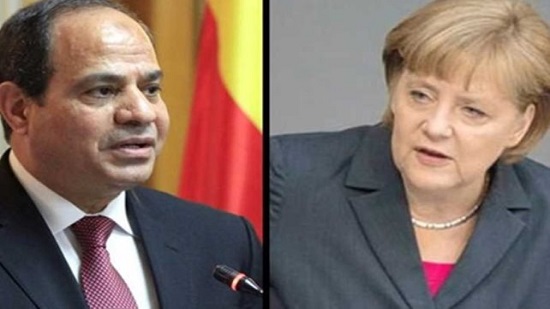German Chancellor Angela Merkel called Egyptian President Abdel-Fattah Al-Sisi last week and their conversation dealt with the present situation in Libya. Chancellor Merkel, who will be hosting this month in Berlin an international meeting on Libya, shared with the Egyptian president some ideas concerning the best avenues to broker a ceasefire in Libya in order to move forward with the United Nations initiative that the UN Security Council unanimously adopted two years ago in a special summit meeting on Libya.
The Egyptian president, according to a declaration by the presidential spokesman, reiterated the known Egyptian positions in this regard; namely, the disbanding of armed militias and the restoration of state authority.
The phone call aimed at soliciting Egyptian support for an immediate ceasefire around Tripoli, and the withdrawal of the forces under the command of Field Marshal Khalifa Haftar, who has laid siege to the southern approaches of Tripoli since April. From a military point of view, his forces have failed so far to break the defences of the city. And there are no indications that these forces will enter the capital anytime soon. Such a military stalemate makes the implementation of the UN peace plan all the more difficult.
The German chancellor would love nothing more than Egypt to contribute to the successful conclusion of the upcoming Berlin meeting by persuading Haftar to end his offensive and to begin withdrawing his troops from around southern Tripoli. From an Egyptian point of view, the most important imperative is the defence of our extended borders with Libya, so as to deny terrorist groups from infiltrating our country.
Egypt stands to gain diplomatically if it succeeds in persuading the Libyan Field Marshal to implement an immediate and permanent ceasefire. Pulling his troops could come at a later stage, or as a gesture of good will towards the Germans and the Europeans. Such a change of direction on the part of Egypt should be introduced in the framework of a larger reassessment of Egyptian foreign policy in the Arab world during the last eight years. For long, the country has adopted subdued positions vis-à-vis key questions, like how to deal with the Syrian government (until this day, diplomatic relations have not been restored with Damascus; nor has Cairo any open contacts with the Libya’s Government of National Accord, the internationally-recognised government).
A point of departure could be a public position by the Egyptian government on the explicit American call on the “Libyan National Army” to end its “offensive on Tripoli”. This call was made last week in after the United States and the Government of National Accord in Tripoli held the US-Libya Security Dialogue on Thursday, 13 November. In the joint statement dated 14 November, the State Department said bringing an end to the attacks against the Libyan capital “would facilitate further US-Libya cooperation to prevent undue foreign interference [in Libya], reinforce legitimate state authority and address the issues underlying the conflict”. These aims don’t contradict some of the objectives that Egypt has espoused all along. Egyptian support of such a call would send a clear signal to all Libyan political forces that Egypt is ready to help significantly with its international and European partners such a necessary turnaround. In other words, Egypt should do its best to end the military stalemate around Tripoli and join international efforts, under the United Nations, to move forward. In the medium and long-term, it is in Egypt’s national interest to stabilise Libya, all the more so after the dramatic political developments in Tunisia in the post-Essebsi era during which Egypt, Tunisia and Algeria saw almost eye-to-eye on how to deal with Libya. The three countries who share geographic borders with Libya had common interests there. However, with the election of two leaders from Al-Nahda, Tunisia’s Muslim Brotherhood (to the speakership of the representative assembly and the other to form the government), the Tunisian position towards Libya has become problematic to say the least.
One thing is certain. Egypt can’t afford not to have a second look at its present declared policy in Libya. If left unchanged, this policy would become neither effective nor credible. And I would also add, nor sustainable in the long run. The trip that the Egyptian president made to Abu Dhabi 13-14 November could have provided Egypt and the United Arab Emirates the occasion to address the Libyan question anew in light of recent developments. The Berlin meeting on this question will doubtless prove an unmistakable signal that the UN plan should be implemented, after two and a half years of procrastination.
The new hoped-for Egyptian position should be Arab-inspired and Arab-based, to be effective. Egypt should work through the Arab League, on the one hand, and bilateral diplomatic channels on the other, to push for a united Arab position on Libya. That would render Egyptian influence on later internal political developments in Libya more forceful and determining. The policy of choosing sides amongst various Libyan parties is no longer tenable.
The Middle East and North Africa are undergoing deep changes that, when consummated, would be a radical departure from the Middle East and North Africa of the post-World War II era.
Egyptian diplomacy should necessarily take this into account. In transformative periods, countries need to be alert to impending changes and modify their foreign policies accordingly.



